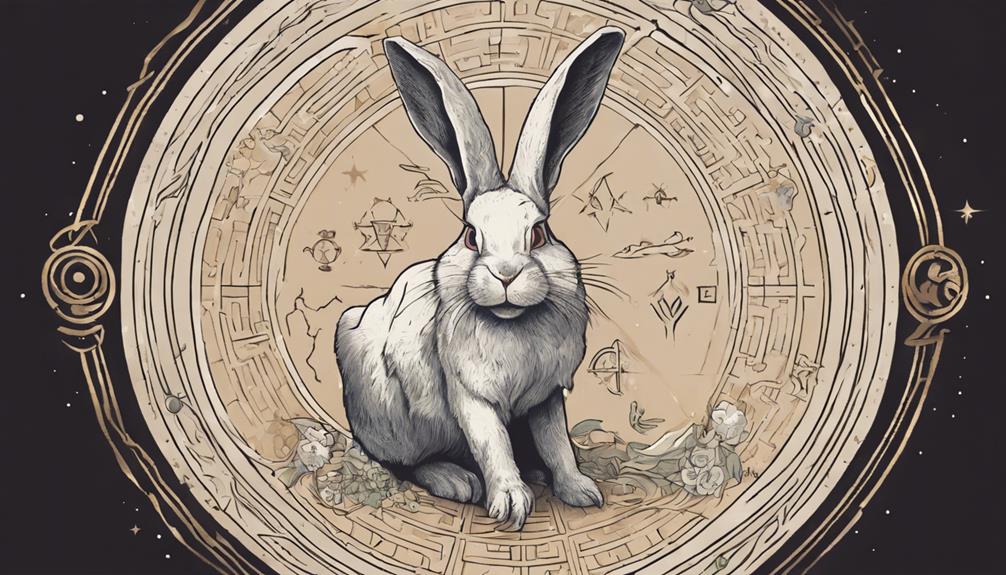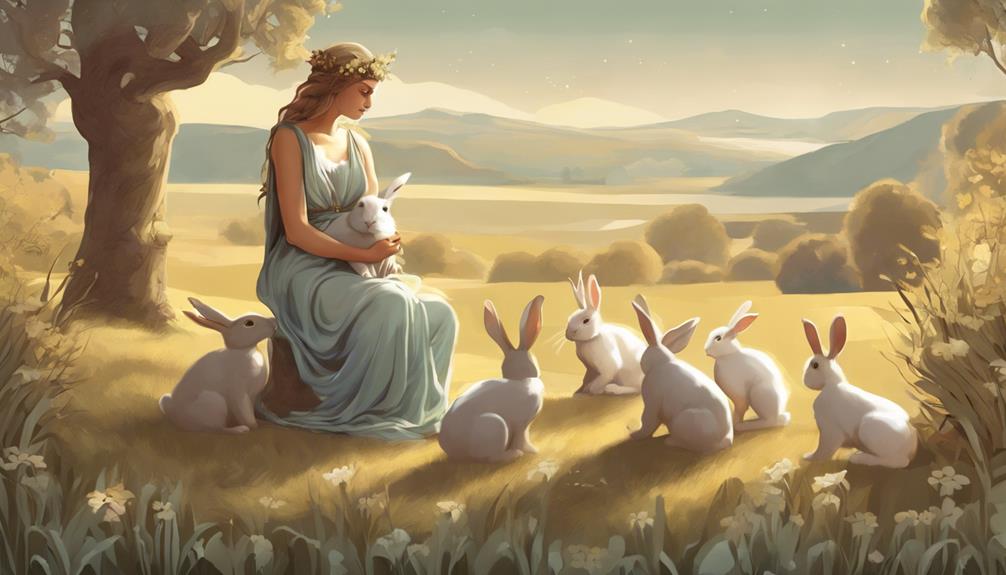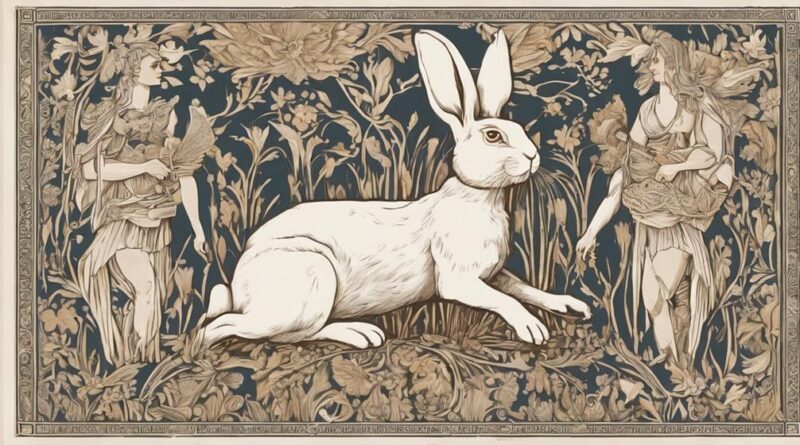Top 10 Rabbit References in Greek Mythology
Discover the top 10 captivating rabbit references in Greek mythology. From the Rabbit in the Moon to Eros and the Rabbit, each tale embodies fertility, agility, and divine symbolism. Explore the significance of the Rabbit in the Underworld, its connection with Artemis and Apollo, and its representation in the Zodiac. Uncover the gentle and compassionate nature of the Rabbit in myths and its portrayal in Aesop's Fables. Dive into the intricate symbolism of the Rabbit in the Tale of Demeter for a deeper understanding of its role in ancient Greek narratives.
The Rabbit in the Moon
When observing the moon in Greek mythology, you may notice the presence of a rabbit, a symbol with significant cultural and symbolic importance. The connection between lunar symbolism and rabbit mythology dates back centuries and has been a recurring theme in various cultures worldwide. In Greek mythology, the concept of 'moon rabbits' holds a particular fascination.
Cultural interpretations of the rabbit in the moon vary across different societies, with common themes emerging in Greek mythology. The rabbit is often associated with fertility, rebirth, and the cycles of nature. In Greek folklore, the rabbit is linked to the lunar deities, representing their connection to the moon's phases and the changing seasons.
The moon rabbits in Greek mythology serve as messengers between the mortal world and the celestial realm. They're believed to bring tidings of wisdom, intuition, and hidden knowledge. The presence of a rabbit in the moon signifies protection, good fortune, and the guiding light that leads individuals through life's uncertainties.
Eros and the Rabbit
What significance does Eros hold in relation to the symbolism of the rabbit in Greek mythology? Eros, the Greek god of love and desire, is often depicted with rabbits due to the following reasons:
- Fertility and Rebirth: Eros' influence is closely tied to fertility and the cycle of life. In Greek mythology, rabbits are known for their prolific breeding habits, symbolizing fertility and rebirth. The association between Eros and rabbits underscores the idea of new beginnings and the perpetuation of life.
- Speed and Agility: Rabbits are known for their agility and quick movements. Eros, being a swift and nimble deity, is often linked to the characteristics of the rabbit. This connection emphasizes Eros' influence in matters of love and desire, showcasing how swiftly these emotions can manifest and change.
- Companionships and Playfulness: Rabbits are social animals that often form close bonds with their companions. Eros, as a god who unites individuals through love, mirrors this aspect of rabbit companionships. The playful nature of rabbits also aligns with Eros' mischievous personality, highlighting the joy and spontaneity found in relationships influenced by the god of love.
The intertwining of Eros' characteristics with the symbolism of rabbits in Greek mythology enriches the understanding of love, fertility, and interconnectedness in ancient Greek beliefs.
Rabbit in the Underworld
The association of rabbits with the Underworld in Greek mythology reveals intriguing connections to themes of transformation and renewal within the realm of death and rebirth. One of the most prominent instances of a rabbit's involvement in the Underworld is seen in the myth of the goddess Persephone. As the story goes, Persephone was abducted by Hades, the ruler of the Underworld, and taken to his realm. During her time in the Underworld, Persephone underwent a profound transformation, from a maiden picking flowers to becoming the queen of the Underworld. This journey symbolizes the cycle of life, death, and rebirth.
In another tale, the rabbit is believed to have made a journey to the Underworld as well. This journey is often associated with the story of Orpheus, the legendary musician and poet. According to some interpretations, the rabbit ventured into the Underworld alongside Orpheus during his quest to bring back his beloved wife, Eurydice. The rabbit's presence in this journey signifies its role as a guide or companion in times of transition and change.
The Rabbit and Artemis
Delving into the mythological connections between rabbits and the goddess Artemis reveals intricate layers of symbolism and significance within Greek folklore. Artemis, often associated with fertility and the protection of young life, shares a profound connection with the rabbit in Greek mythology. Here are some key points that shed light on the relationship between Artemis and the rabbit:
- Artemis and Fertility: In Greek mythology, Artemis is revered as a goddess of fertility, particularly concerning wild animals and the natural world. The rabbit, known for its prolific breeding habits, symbolizes fertility and the cycle of life. The association between Artemis and the rabbit emphasizes her role in nurturing and preserving life in the natural order of things.
- Rabbit as a Companion: Within Greek mythology, the rabbit is sometimes depicted as a companion to Artemis, accompanying her on her hunts and adventures. This companionship signifies the harmony between the goddess and the natural world, portraying the rabbit as a loyal and swift creature that aids Artemis in her pursuits.
- Symbol of Grace and Agility: The rabbit's agility and gracefulness are qualities that align with Artemis's attributes as a swift and agile huntress. The rabbit's presence in Artemis's realm highlights not only its physical characteristics but also its symbolic representation of speed, dexterity, and keen senses, all of which are qualities revered in both the goddess and the animal.
The Rabbit and Apollo
Exploring another significant connection within Greek mythology, the rabbit's role alongside Apollo unveils a compelling narrative of intertwined symbolism and meaning. Apollo, the god of music, poetry, and healing, also had a strong association with the sun. The rabbit, known for its quickness and fertility, symbolized various aspects that complemented Apollo's characteristics.
In Greek mythology, Apollo's connection to the rabbit often represented agility and swiftness. The rapid movements of the rabbit mirrored Apollo's speed and grace, emphasizing the god's ability to swiftly move across the sky in his sun chariot. Additionally, the rabbit's reputation for fertility aligned with Apollo's role in bringing life and vitality to the world through his association with the sun.
Moreover, the rabbit's symbolic significance extended to themes of renewal and transformation, which resonated with Apollo's role as a healer. The ability of rabbits to burrow underground and emerge into the light symbolized the journey from darkness to enlightenment, reflecting Apollo's influence in guiding individuals towards healing and self-discovery.
Rabbit as a Messenger
Upon examining Greek mythology, one finds the rabbit portrayed as a significant messenger, embodying symbolism that transcends mere physical presence. In various ancient tales and folklore, the rabbit's role as a messenger carries deep cultural significance and symbolic meanings. Here are some key aspects to consider:
- Rabbit Symbolism: In Greek mythology, the rabbit is often associated with the moon due to its nocturnal nature. As a messenger, the rabbit symbolizes intuition, mystery, and femininity. Its ability to move swiftly and navigate hidden paths signifies agility of thought and quick thinking, making it a powerful symbol in communication and delivering important messages.
- Cultural Significance: The rabbit's portrayal as a messenger in Greek mythology reflects the cultural importance placed on swift and accurate communication. The ability of the rabbit to traverse different terrains with ease symbolizes adaptability and resourcefulness, qualities highly valued in ancient Greek society.
- Rabbit Folklore: Ancient tales often depict the rabbit as a messenger between the mortal world and the divine realm. In some stories, the rabbit acts as a mediator, carrying messages between gods and humans, highlighting its role as a bridge between different worlds and dimensions.
The Rabbit in the Zodiac

The Rabbit holds a significant place in the zodiac, embodying unique characteristics and influences that shape individuals born under this sign. People born under the Rabbit sign are known for their gentle and compassionate nature. They're often kind-hearted, sensitive, and have a strong intuition that allows them to connect deeply with those around them. Rabbits are also creative individuals with a knack for artistic pursuits, making them excellent at expressing themselves through various forms of art.
In terms of compatibility, Rabbits are most compatible with individuals born under the signs of the Sheep, Pig, and Dog. These signs share similar values with the Rabbit, such as a love for peace, harmony, and emotional connection. The Rabbit finds comfort and understanding in these relationships, fostering deep and lasting bonds.
However, Rabbits may face challenges in relationships with individuals born under the signs of the Rooster and Rat. These signs have personalities that may clash with the Rabbit's sensitive nature, leading to misunderstandings and conflicts. It's essential for Rabbits to communicate openly and honestly with these signs to navigate potential challenges and build strong relationships based on mutual respect and understanding.
Rabbit Symbolism in Myths
In Greek mythology, the symbolism of rabbits intertwines with various tales and legends, offering insights into the significance of these creatures in ancient narratives. Cultural interpretations and symbolic meanings associated with rabbits in myths reveal a deeper understanding of their representation in Greek culture.
These interpretations often reflect qualities such as fertility, agility, and cleverness, which were highly valued traits in ancient Greek society. Mythological connections and folklore origins further enrich the symbolism of rabbits in Greek myths, showcasing their roles as messengers, companions, or even tricksters in different stories.
Rabbits aren't merely passive creatures in these narratives but often play active and essential roles, adding layers of meaning to the tales they appear in. The symbolic meanings of rabbits in Greek myths serve as cultural touchpoints, reflecting societal values and beliefs through these animal representations.
Ultimately, exploring the significance of rabbits in Greek mythology unveils a rich tapestry of symbolism and cultural significance, shedding light on the intricate ways in which ancient Greeks incorporated animals into their stories and legends.
Rabbit in the Tale of Demeter

Noteworthy for its intricate symbolism and narrative depth, the tale of Demeter features a significant presence of a rabbit, adding layers of meaning to the story's thematic elements. In the myth of Demeter, the goddess of agriculture, and her daughter Persephone, the rabbit plays a crucial symbolic role representing fertility, renewal, and the cycle of life and death.
The rabbit symbolism in the tale of Demeter is most prominently seen in the context of Persephone's abduction by Hades, the god of the underworld. As Demeter searches frantically for her daughter, grieving and causing the earth's vegetation to wither, the rabbit embodies the natural world's response to this upheaval. Just as the rabbit burrows into the earth and later emerges, so too does the cycle of life continue even in the face of tragedy.
Moreover, the rabbit's presence in the tale of Demeter serves as a reminder of the interconnectedness of life and death, growth and decay. Its ability to multiply rapidly underscores the theme of regeneration and the enduring cycle of nature. By incorporating the rabbit symbol, the myth of Demeter becomes not just a story of loss and recovery but also a profound meditation on the eternal rhythms of existence.
The Rabbit in Aesop's Fables
Pivoting from the significance of the rabbit in the tale of Demeter, exploring its role in Aesop's Fables reveals further layers of symbolism and moral lessons embedded in these ancient narratives. In Aesop's Fables, the rabbit often embodies characteristics that impart valuable lessons to the reader.
- Rabbit wisdom: The rabbit in Aesop's Fables is frequently portrayed as quick-witted and resourceful, relying on its intelligence rather than sheer strength to overcome challenges. This emphasizes the importance of cleverness and adaptability in navigating life's obstacles.
- Aesop's moral lessons: Through the actions and consequences faced by the rabbit in these fables, Aesop imparts moral lessons about humility, perseverance, and the consequences of arrogance. The rabbit's experiences serve as cautionary tales that warn against the pitfalls of hubris and the virtues of modesty.
- Symbolism of the rabbit: In Aesop's Fables, the rabbit is often used as a symbol of innocence and vulnerability, contrasting with its cunning nature. This duality highlights the complexity of human characteristics and the importance of balance in one's behavior.
Frequently Asked Questions
Why Are Rabbits Associated With the Moon in Greek Mythology?
In Greek mythology, rabbits are associated with the moon due to their connection to lunar symbolism and fertility. Across cultures, rabbits are linked to the moon phases and are often featured in rabbit folklore as creatures that symbolize the cycles of nature.
Their prolific breeding habits align with themes of fertility and regeneration, making them a natural fit for moon-related symbolism in Greek mythology.
How Did Eros Come to Be Connected With Rabbits?
Eros, the Greek god of love, became connected with rabbits through symbolism and Rabbit folklore.
In ancient Greek culture, rabbits were often associated with fertility, abundance, and quick reproduction. Eros, being a symbol of desire and passion, was linked to the prolific nature of rabbits, representing the rapid growth and spread of love and affection.
This connection reinforced Eros's role in spreading love and fertility throughout the world.
What Role Does the Rabbit Play in the Greek Underworld?
In Greek mythology, the rabbit symbolism in the underworld represents agility and fertility.
The rabbit's connection to the underworld is often linked to its ability to navigate between realms swiftly.
It serves as a messenger between the different worlds, carrying messages and information.
This association highlights the rabbit's dual nature as a creature that moves effortlessly between life and death, symbolizing the cyclical nature of existence in Greek mythology.
Why Is Artemis Closely Linked to Rabbits in Myths?
Artemis is closely linked to rabbits in myths due to the symbolism they carry. In Greek mythology, rabbits are often associated with fertility, quickness, and the moon. Artemis, as the goddess of the hunt and wilderness, embodies these traits.
The rabbit connection showcases her protective and nurturing nature, as well as her connection to the cycles of nature. This association highlights Artemis's multifaceted role as a guardian of wildlife and the natural world.
How Is Apollo Connected to the Symbolism of Rabbits in Greek Mythology?
In Greek mythology, Apollo's influence on rabbit symbolism is linked to his association with the sun and fertility. Rabbits are known for their prolific breeding, symbolizing growth and abundance. Apollo's connection to light and life ties him to these aspects of rabbits.
Additionally, some myths suggest that Apollo had a protective and nurturing side, akin to the care rabbits show for their young. This intertwining of themes underscores the depth of Apollo's link to rabbit symbolism.
Conclusion
In conclusion, Greek mythology is filled with various references to rabbits, showcasing their significance and symbolism in ancient storytelling. From the Rabbit in the Moon to tales of Artemis and Apollo, these creatures play a role in myths that have been passed down through generations.
Their representation in different contexts sheds light on the cultural beliefs and values of the time, offering a glimpse into the intricate world of Greek folklore.
